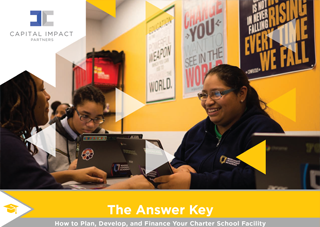Capital Impact Partners Debuts New Guide for Building and Expanding Charter School Facilities
“How-to” Tool Aims to Help Charter School Operators Navigate the Facility Development Process from Concept to Financing
Arlington, VA (October 11, 2017) — The process for building or expanding a charter school can be complicated and daunting. Enter The Answer Key by Capital Impact Partners, a simple how-to guide with practical tools designed to help school operators successfully navigate the construction process.
Covering each phase of the facility development process – including concept, predevelopment, design and pre-construction, construction, and financing – the step-by-step publication is based on Capital Impact’s 20 years of supporting and financing successful charter schools across the country. A number of education practitioners with real-world construction experience also lent their expertise to the guide.

The Answer Key compiles step-by-step, expert guidance on constructing and expanding charter schools. Download it here: www.capitalimpact.org/theanswerkey.
“As part of our mission-driven approach to promoting equitable access to education for all students, regardless of socioeconomic or racial backgrounds, we created The Answer Key to serve as an open-source tool for all those looking to build a high-quality charter school for their community,” said Ellis Carr, president and CEO of Capital Impact Partners. “We hope this body of work compiled by our lending, construction, and legal teams – as well as a host of partners – helps organizations overcome any obstacles to bring a new school facility online.”
Contributors to The Answer Key include Joyce L. Montgomery at Charter Schools Development Center; Kate Hirsh, formerly with Pacific Charter School Development; Thomas E. Porter from Building Hope; Erin Mote and Dr. Eric Tucker of Brooklyn LAB Charter School; and Sarah Kirby Tepera of Montessori For All. The Answer Key also includes input from Capital Impact’s in-house construction team.
Walking Charter Schools through the Facility Development Process
The Answer Key takes charter school operators through the key phases of facility development:
- Concept – including conducting demand and feasibility studies, completing a needs assessment, and creating a preliminary capital budget;
- Predevelopment – including assembling a development team, determining criteria for site selection, confirming zoning codes, and refining a budget;
- Design and pre-construction – including determining a final space assessment and design, developing preliminary building plans, securing permits, and formalizing a budget and financing;
- Construction – including selecting a general contractor, and managing inspection and certificate of occupancy issuance procedures; and
- Financing – including knowing what lenders look for, mitigating risk, identifying the best financing options, and identifying sources of flexible financing other than conventional loans to match revenue and cash flow streams.
“For organizations that have never worked on construction projects, managing the process is quite intimidating, but it shouldn’t have to be,” said Kristofer Johnston, construction manager at Capital Impact. “It is important to us to offer construction support and guidance, in addition to our financing services. The Answer Key lays out those key steps necessary to easily guide charter school operators through successfully managing their facility development project.”
Another feature of The Answer Key are several printable tools. These include:
- Timeline for the facility development process, with key milestones along the way;
- Sample project schedule that digests key elements found in each chapter;
- Variety of appendices including: needs assessment worksheet; project sources and uses template; financing evaluation worksheet; lender documents; construction consultant checklist; and preliminary budget worksheet; and
- Glossary of key terminology.
Real-World Case Studies
Capital Impact has partnered with a variety of organizations, small and large, across the country to complete the building of new facilities or expansion of existing ones. The Answer Key further captures that experience through real-world case studies based on the focus of each chapter. These include:
CONCEPT: The St. Paul campus houses two schools in northeast Washington, D.C. – Lee Montessori Public Charter School and the Washington Leadership Academy. Founded in 2014 and 2015 respectively, they soon needed space to expand. Capital Impact participated in the loan to purchase and renovate the St. Paul campus, contributing $4.375 million of the nearly $16 million loan.
PREDEVELOPMENT: Montessori For All is a nonprofit charter management organization in Austin, Texas, with the aim of closing the achievement and opportunity gap in its community. It is the school’s goal to have a student body that is approximately 50 percent low-income. Capital Impact ultimately provided Montessori For All with $5 million in New Markets Tax Credits allocations along with an $8.4 million leverage loan to construct eight permanent buildings on-site to replace its leased portable structures.
DESIGN AND PRE-CONSTRUCTION: Brooklyn LAB opened in 2014 and currently serves more than 450 low-income, 6th-8th grade students in downtown Brooklyn, New York. It has evolved since into a community hub by selecting a downtown site and fostering partnerships with local organizations and institutions of higher learning. Given their central location, they needed to renovate an existing building rather than build a new one. To help Brooklyn LAB meet its design and construction goals, Capital Impact Partners provided the school a $3.5-million construction loan for the project, enabling the school to renovate.
CONSTRUCTION: Equitas Academy provides K-5th education to the low-income community of Pico-Union in central Los Angeles. Nearly all students qualify for the free or reduced price lunch program and 62 percent of students are new English speakers. Capital Impact helped secure $8.9 million in New Markets Tax Credits for Equitas to renovate the school and nearly double its capacity.
Building Charter School Capacity for Long-term Success
As a mission-driven Community Development Financial Institution (CDFI), Capital Impact focuses on advancing and supporting projects that help people build communities of opportunity that break barriers to success. Education has been central to Capital Impact’s national community development work for more than two decades.
With that focus in mind, Capital Impact has formulated a strategy for financing charter schools that engaged partners that works to deliver solid educational opportunities for students in communities where those opportunities do not exist within the local public school framework. Capital Impact services include providing strategic financing, delivering capacity building tools, advancing social impact programs, and supporting public policy reforms. To date, the organization has delivered $738 million in financing to 235 charter schools, increasing access to more than 235,000 students across the country.
“Charter schools are altering the educational landscape for underserved communities nationwide. Fostering their growth is helping to close the achievement gap for students who are not receiving a high-quality education simply because of where they live,” noted Carr. “Capital Impact is proud to extend tools like The Answer Key to help our charter school partners achieve success that ensures that kids can pursue their dreams in school and beyond.”
###
About Capital Impact Partners: Through capital and commitment, Capital Impact Partners helps people build communities of opportunity that break barriers to success. We deliver strategic financing, incubate new social programs, and provide capacity-building to help ensure that low-to-moderate-income individuals have access to quality healthcare and education, healthy foods, affordable housing, and the ability to age with dignity. A nonprofit community development financial institution, Capital Impact Partners has disbursed more than $2 billion to revitalize communities over the past 30 years. Our leadership in delivering financial and social impact has resulted in Capital Impact earning a “AA” rating from S&P Global “AA” and being recognized by Aeris since 2005 for our performance. Headquartered in Arlington, VA, Capital Impact Partners operates nationally, with local offices in Detroit, MI, and Oakland, CA. Learn more at www.capitalimpact.org.







